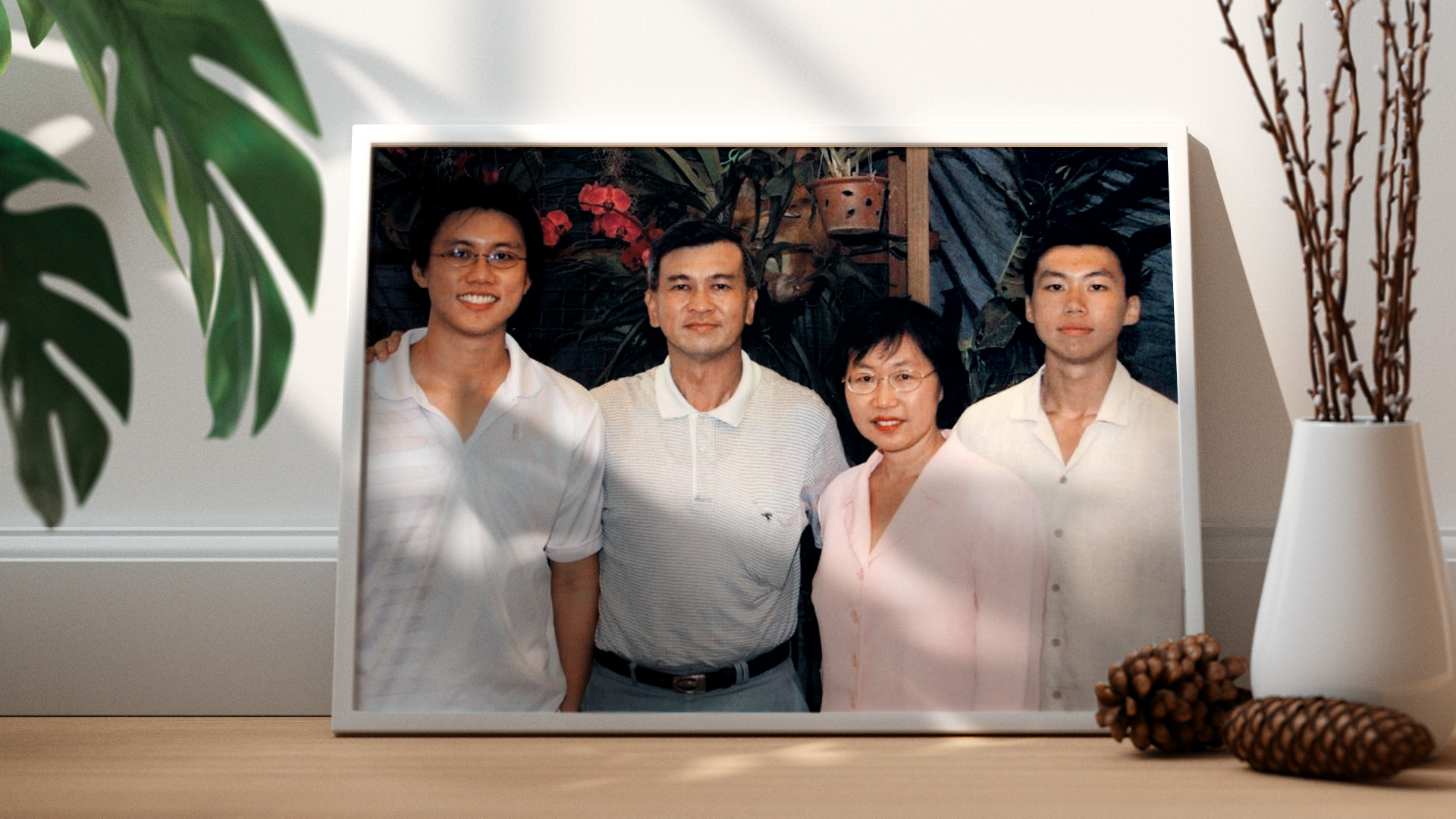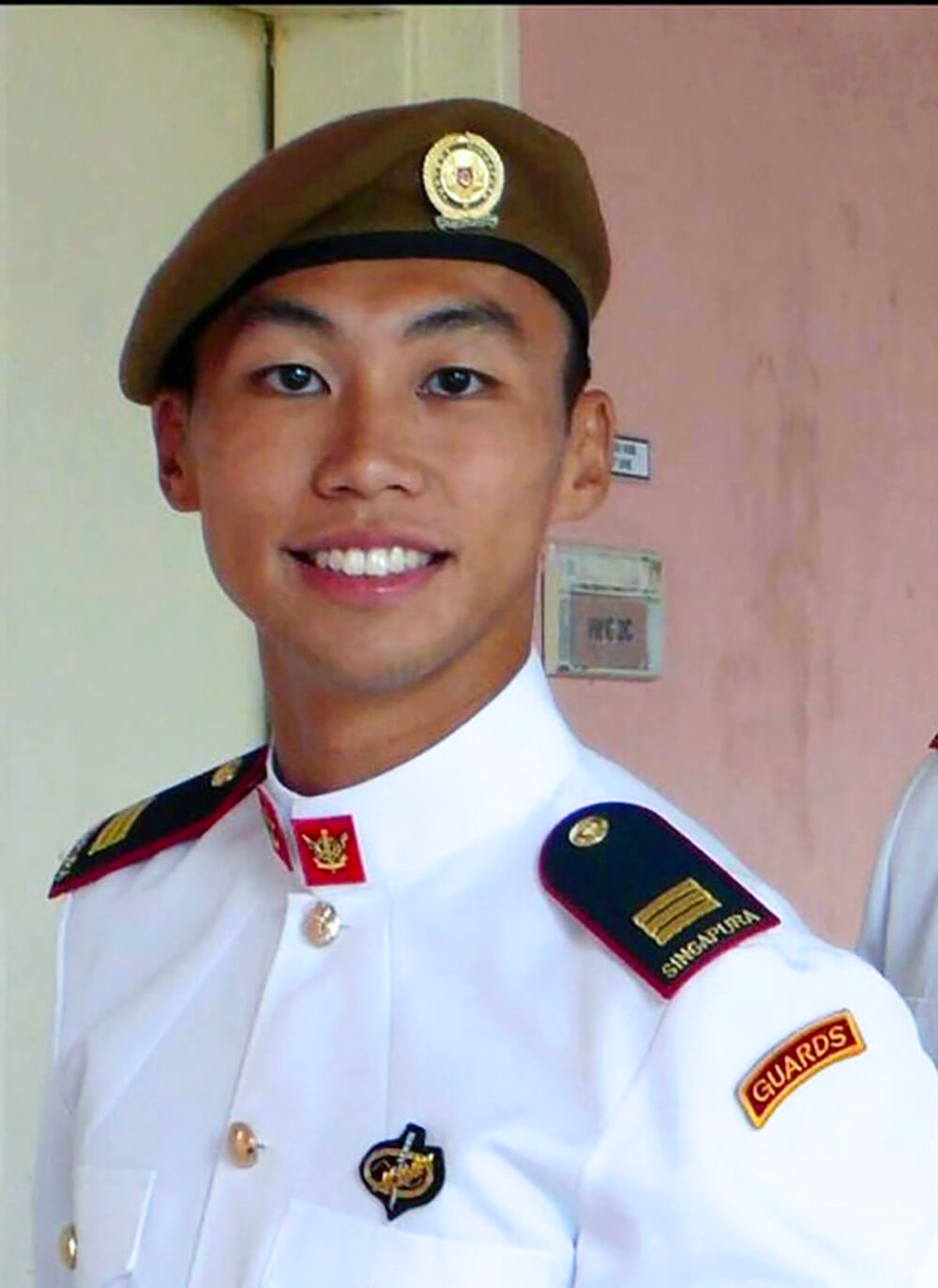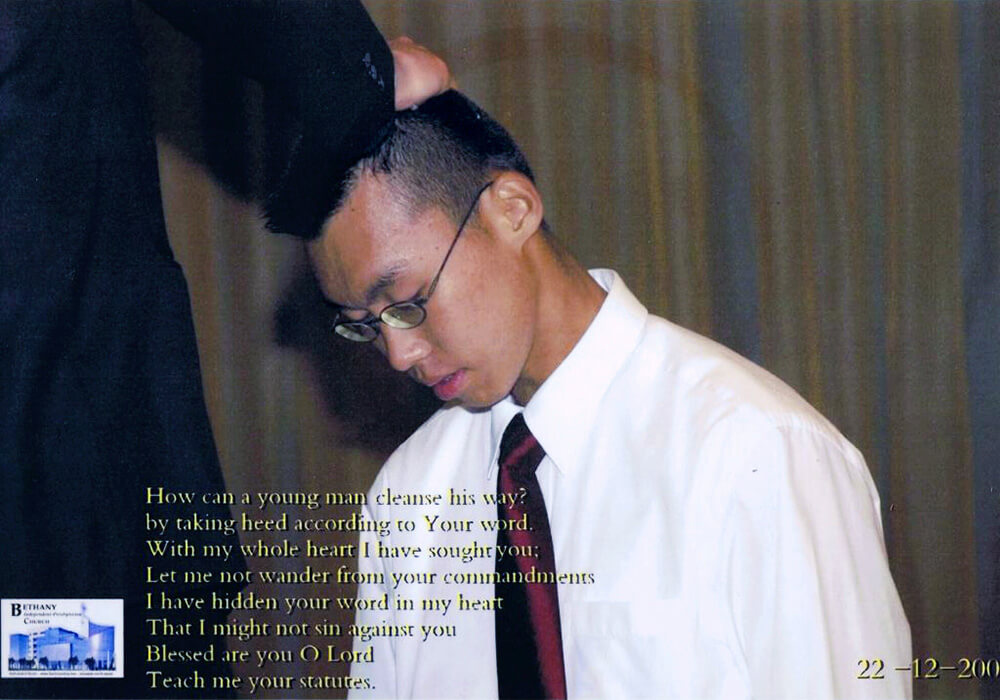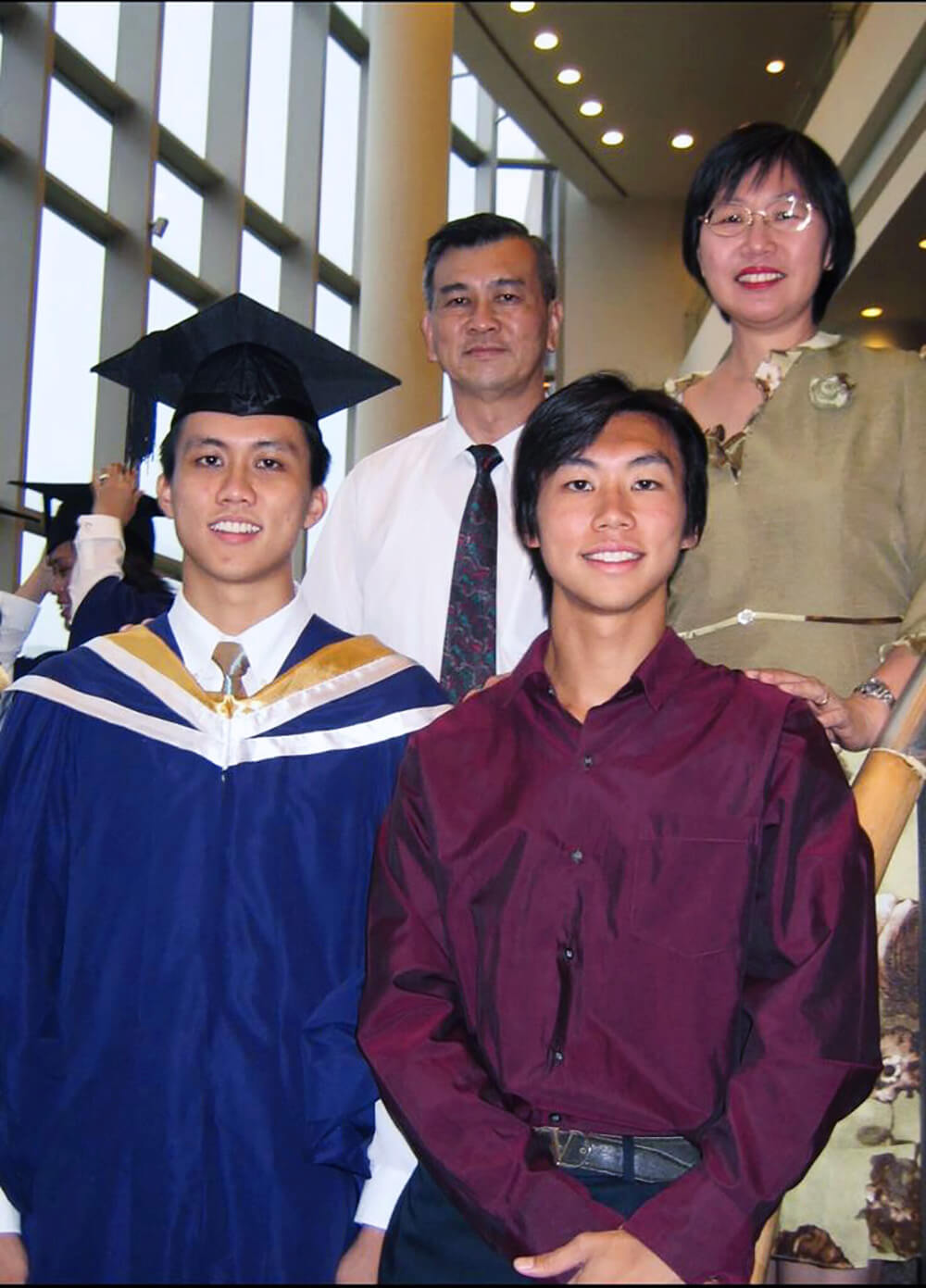
It was about 7:40 a.m. on 26 August 2007, and we were just getting ready to go to church when the phone rang.
“Who would be calling at this hour on a Sunday?” we asked ourselves.
My husband Saw Keng picked up the phone. It was Si Yu, our elder son. He was in Indonesia on a business trip, but had received a call from the organisers of the Army Half Marathon. Our younger son Si Qiu, an army captain in the Singapore Armed Forces, was running in the race, and had given his brother’s number as the emergency contact.
Si Yu had shocking news: Si Qiu had collapsed at the run.
Si Yu urged us to rush down to the Accident & Emergency department at the Singapore General Hospital (SGH), where his girlfriend Yi Yong, a doctor working there, would meet us.
“Why? Why didn’t God protect him? Why didn’t the A&E department help? How did it happen?”
On the way to SGH, I called a church friend to inform our pastor and to support us in prayer. A great sense of unease filled me, but I tried to keep calm and not imagine the worse. Saw Keng drove in silence, staring straight ahead, but I could see that he, too, was trying to control his emotions.
Desperate for more information, I decided to call the hospital number Si Yu had given me. When I asked the person how my son was, there was a long pause.
“Wait a while,” he said. My heart sank immediately. In that moment, I cried out to God for mercy. “Please, let nothing happen to my son.”
But a doctor, who had come to the phone, told me apologetically, “I’m sorry, he did not make it.”
I couldn’t believe what I had just heard. I turned to my husband and said simply, “Our son didn’t make it.”
Overwhelmed by shock, we carried on in silence. As we pulled up to the hospital, questions started to flood my mind. “Why? Why didn’t God protect him? Why didn’t the A&E department help? How did it happen?”
Earlier in the year I had accompanied my late father to the same department three times, but this time, we were led to a room opposite that bore a sign saying “DOA”—Dead On Arrival.
My world started to become a blur and my knees almost gave way as the reality of it all started to sink in.
My son Si Qiu was gone.
 Si Qiu was an army captain in the Singapore Armed Forces
Si Qiu was an army captain in the Singapore Armed Forces
Through the Darkest Valley
There he was, my dearest son, whom I had loved and treasured deeply for 25 years. He looked like he was asleep on the bed, with a tube inserted in his mouth and a smile on his lips. There was a look of peace on his face.
“Auntie, he didn’t suffer,” Yi Yong told me gently. “There was no pain, no discomfort.” Her words brought much comfort to my heart.
As I sobbed, I was reminded by the words of 2 Corinthians 5:6–8, which my pastor often shared with bereaved families. They, too, comforted me and reminded me that Si Qiu was safe in Jesus’ arms.
“We are always confident and know that as long as we are at home in the body we are away from the Lord. For we live by faith, not by sight. We are confident, I say, and would prefer to be away from the body and at home with the Lord.”
But I still couldn’t help asking why God had taken Si Qiu home. “Why now?” I asked. “How was I going to carry on without Si Qiu? Our lives had been so intertwined; his joy had been my joy, and his sorrow, my sorrow. Why had this happened? Why us? Why now?”
Saw Keng, too, had the same questions. “Why did You take him away? He had such a bright future. He’s a good boy, a good Christian. Why didn’t You take me? I don’t have much time left anyway.”
Si Qiu had just come out of a difficult teenage phase. Once a warm, caring boy, our younger son had become withdrawn and indifferent. He struggled with school, just barely scraping through his exams.
“Parents must lead the way. We have to be very careful. We are living examples for our children.”
After my husband and I came to know the Lord Jesus Christ and started bringing our two sons to church in 1997, he would sit in the pew with arms folded, making his disinterest clear. When we stayed back after service to chat with churchmates, Si Qiu would run off. He didn’t want to hang around a moment longer. Some of his peers described him as “sullen”.
Si Qiu’s bad behaviour troubled us greatly. We just didn’t know what to do with our difficult son. One day, however, our pastor reminded us parents to take care in how we walked and talked.
“Your children will reflect you,” he said. “Parents must lead the way. We have to be very careful. We are living examples for our children.”
Instead of scolding him or getting angry, we had showed great concern for his safety. Later, he would testify that our concern and love reminded him of God’s love for him.
That changed my perspective of relating to my son. Instead of just fretting about Si Qiu, I started to take a more positive approach. Instead of nagging him, I started to be more patient and encouraging. I prayed that God would change his heart. We also asked someone in church to give him tuition, and the brother who taught him formed a bond with him.
God showed us that He was sovereign, and that He would turn Si Qiu around in His own time.
In 2000, Si Qiu was driving our car when he got involved in an accident. The car was wrecked, but he walked out unscathed. This proved to be a turning point in his life. He told us later that what surprised him most was our response.
Instead of scolding him or getting angry, we had showed great concern for his safety. Later, he would testify that our concern and love reminded him of God’s love for him.
In his testimony, he wrote: “I was reminded of the Lord Jesus’ suffering and death that cleansed me from sins and yet I failed to appreciate His love and kept sinning against Him . . . In my heart, I was sure that I needed a new life and most importantly, I recognised that I needed the Lord Jesus back in my life.”
He reminded me that He loved me and Si Qiu, and by His grace, I had to learn to trust and love Him, too.
Si Qiu was baptised in December 2002, and his life took a complete U-turn. He decided to enlist as an officer in the army, and was eventually awarded a scholarship to further his studies in Australia.
At church, he was a new man. The sullen teen became a gentleman, always jumping in to help others. He was slow to anger and quick to help. Having experienced God in his life, he spent much time reading the Bible and praying. One of his favourite phrases was “fear of the Lord”, which he would mark in the margin of his Bible. It was something he sought to live out.
So why was God taking Si Qiu away now, when he had just turned his life round and was seeking God wholeheartedly?
That night, after we went home, I cried my heart out. I just couldn’t stop asking why this had to happen.
God, however, understood our grief.
He reminded me that He loved me and Si Qiu, and by His grace, I had to learn to trust and love Him, too. Psalm 37:3–4 became a source of strength.
“Trust in the Lord and do good;
dwell in the land and enjoy safe pasture.
Take delight in the Lord,
and he will give you the desires of your heart.”
As I meditated on these verses and tried to put them into practice, I sensed a gentle feeling in my heart that said: “Be My witnesses.“
“What do you mean, God?” I replied. “You just took away my son. How can I be Your witness?”
The prompting came back: “Be My witnesses.”
“This is not going to possible unless You help me, Lord,” I murmured to myself.
But I knew the Lord wanted us to share about His love and grace at home and at work, and thought of a few people I would tell. Painfully and obediently, I knew I had to learn to trust the Almighty God to help me answer His call, one step at a time.
 Si Qiu was baptised in 2002 after a difficult teenage phase
Si Qiu was baptised in 2002 after a difficult teenage phase
Beside Quiet Waters
Over the next few days, I felt a sense of peace start to replace the turmoil inside me. Perhaps, I thought, something good would come out of Si Qiu’s death. Several friends and relatives encouraged me with John 12:24:
“Very truly I tell you,
unless a grain of wheat
falls to the ground and dies,
it remains only a single seed.
But if it dies, it produces many seeds.”
At the funeral service, I started to see this truth unfold. As I watched more than 800 people fill the sanctuary, I realised how Si Qiu would continue to touch lives even in death.
From school and polytechnic classmates to university friends and army mates, they came to see for themselves how Christians would celebrate life and cope with death, and what faith in our Lord really meant. They got to see that we did not have to fear death, because we have hope and the promise of eternal life.
I believe that many who came got to witness the love of God, expressed through the support we received from fellow believers and through the unity of the church.
As a church, we had a chance to bear great testimony for the Lord. I believe that many who came got to witness the love of God, expressed through the support we received from fellow believers and through the unity of the church. We prayed that the messages of hope given during the service would speak to the hearts of those who came, and that through Si Qiu’s demise, some would come to consider faith in the Lord Jesus.
God also gave us much personal comfort by giving us a new insight into our own son’s life.
Si Qiu had not shared much of what he did in the army with us, but now, we saw how much he had achieved. As an officer cadet in training, we were told, he had completed many courses and won awards. At the funeral, a sense of pride filled us as we watched hundreds of soldiers line the road to give our son a grand sending-off. Si Qiu had been a good Christian soldier.
He had fought the good fight, finished the race, and kept the faith (2 Timothy 4:7). Saw Keng and I could not have been more grateful to the Lord for having used our son, both in life and in death.
What comforted us even more were the stories of the impact that our son had made on the lives of others.
From commanders and peers to subordinates, they described Si Qiu as a respected soldier, a loyal friend, a real brother, and a faithful Christian. In church, many praised him for always being there to help with the smallest things. Clearly, God had transformed Si Qiu’s life so that he could live the last few years as a significant Christian.
Si Qiu had served his God and his country to his utmost. He had fought the good fight, finished the race, and kept the faith (2 Timothy 4:7). Saw Keng and I could not have been more grateful to the Lord for having used our son, both in life and in death.
 Si Qiu (bottom right) with his family at his older brother Si Yu’s graduation ceremony
Si Qiu (bottom right) with his family at his older brother Si Yu’s graduation ceremony
Comforted By His Rod and Staff
It has been 15 years since Si Qiu passed away, but we still miss him deeply. Ever so often, we are reminded of the time he spent with us—when we eat the food he enjoyed, smell his favourite air-freshener in the car, read the Bible that he marked, and look into the faces of young men of his age.
Each time, emotions threaten to overwhelm us, and it is only by the grace of God that we have come to terms with his passing. We are constantly reminded that we haven’t lost our son, because we know where he is.
Death can hide but not divide;
Si Qiu is but on Christ’s other side.
He with Christ and Christ with us,
United still in Christ are we.
But God has comforted us in many ways, sometimes through others, sometimes directly. He continues to heal our sorrow.
In church, pastors have helped to lift us up with their spiritual counsel and guidance, teaching us to take a biblical perspective in our journey to healing. Churchmates have rallied around us, comforting us and encouraging us with stories of how Si Qiu had touched their lives. And the Word of God has given us vast comfort from its pages.
God’s strength and grace has helped us to press on and move on.
We are constantly reminded that we haven’t lost our son, because we know where he is.
Si Yu and Yi Yong, who have married, have given us three precious grandchildren, who have brought much delight and joy to us.
Saw Keng continues to keep busy in church; he is part of our Handymen Ministry, which shows their love for God’s house by helping out with repairs and maintenance work around the church and the kindergarten.
We are also active in the Cantonese music ministry, which seeks to encourage and uplift seniors through hymns. Apart from ministering to residents in nursing homes, we have also gone on missions around the region.
And, we continue to pray for loved ones to come to know the Lord. Over the years, we have had the joy of seeing several relatives accept Jesus as their Lord and Saviour.
The Lord our Shepherd
Through all this, God has taught us to trust Him—even when our questions remain unanswered.
Indeed, over the months and years following that fateful day, we have discovered that faith is not a buffer or a cushion that protects us from the sharp edges of life.
Si Qiu’s sudden death had tested our faith. We have learnt that we can trust God and still get hurt; faith that is based on our well-being will not last.
The cross shows us why we can trust in God. God understands our pain, because He, too, saw His own Son die for us on the cross.
The biblical story of Job provides us with many special lessons. When the successful Job suffered the loss of his wealth, family and health, he refused to turn away from God, saying instead: “Shall we accept good from God, and not trouble?” He also said: “The Lord gave and the Lord has taken away; may the name of the Lord be praised.” (Job 2:10, 1:21).
When we lost our son, Saw Keng and I, too, had to ask ourselves if our faith depended on the Lord giving us what we wanted, or if it rested on the mighty love of the Lord who sent His son to die for us.
The cross shows us why we can trust in God. God understands our pain, because He, too, saw His own Son die for us on the cross. In the darkest night of the soul, we have this truth to hang on to: “He who did not spare his own Son, but gave him up for us all—how will he not also, along with him, graciously give us all things?” (Romans 8:32).
We will always trust that God can bring good out of tragedy. In our greatest depths of despair following our son’s death, we were reminded to keep trusting Him that He is in control. We still have many unanswered questions, but Philippians 3:7–9 reminds us that what we have gained in Christ far outweighs whatever we have lost:
“Whatever were gains to me I now consider loss
for the sake of Christ. What is more,
I consider everything a loss because of
the surpassing worth of
knowing Christ Jesus my Lord,
for whose sake I have lost all things.
I consider them garbage,
that I may gain Christ and be found in him,
not having a righteousness of my own
that comes from the law, but that
which is through faith in Christ—the righteousness
that comes from God on the basis of faith.”
People ask me: “Why did God take away your son?” My answer is: I don’t know, but I will continue to have faith and hope in Him. I trust God is sovereign. One day, all our questions will be answered. And one day, we will meet our son again.
“The Lord is my shepherd, I lack nothing.
He makes me lie down in green pastures,
he leads me beside quiet waters,
he refreshes my soul.
He guides me along the right paths
for his name’s sake.
Even though I walk
through the darkest valley,
I will fear no evil,
for you are with me;
your rod and your staff,
they comfort me.”—Psalm 23:1–4



